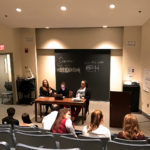
John Celenza, a biology professor and molecular genetics researcher at Boston University, is stepping into his new role as director of the Undergraduate Research Opportunities Program, succeeding Paul Lipton, who stepped down this past summer.
UROP plays a vital role in funding and facilitating research projects by helping students connect with professors who are looking for undergraduate assistance and providing them with the proper funding to carry out their work.
Celenza said he has witnessed the positive impact UROP has had on students through his role on the UROP Faculty Advisory Committee and by mentoring several undergraduate students in his own research lab, which uses molecular genetics to understand how plants defend themselves against insects and pathogens.
“I’ve had over 60 undergraduates do research in my lab and many have received UROP support,” Celenza wrote in an email. “Undergraduates have played a key role in my lab and UROP support has been essential to supporting their work … Many [biochemistry and molecular biology] and biology majors have received UROP funding over the years, so I have seen firsthand the positive impact that UROP has had on our undergraduates.”
Celenza said one of his goals as the leader of the program is to expand research opportunities to academic fields, such as the humanities, that don’t engage in research through UROP as often as STEM fields.
“I am looking forward to coming up with new ways to get more participation from departments and programs that have not had too much involvement in the past years,” Celenza wrote. “Engineering and the natural, physical, and social sciences are an easy fit for UROP; students in the humanities been a bit less involved.”
Former director Lipton, a neuroscience professor in the College of Arts and Sciences, said he thinks Celenza’s experience as a faculty mentor will contribute to his success as the director of UROP.
“He has a long and very positive history serving as a faculty mentor for undergraduates engaged in research,” Lipton wrote in an email. “Professor Celenza’s experience will be vital to help continue to spread the word about the program and the value of undergraduate research in all disciplines.”
Diána Hughes, the program administrator of UROP, said she thinks Celenza’s emphasis on creating relationships between mentors and students will be instrumental to the program’s future success.
“He wants to see how we can create funding for all around the university but also foster mentor relationships, which I think give students a better experience here that they can then use for employment after, or just give them life skills that you would have outside of the classroom,” Hughes said.
UROP assistant director Melissa Johnson said she is excited to see how Celenza’s initiative to expand the program into other fields will benefit BU as a whole.
“He’s been working with the history professors, he’s been reaching out to the english department and he’s really trying to become familiar with those different areas and different types of research,” Johnson said. “He’s been thinking about new rewards which would incentivize students in the humanities to do research and make it a little bit easier for them to get involved,” she added.
Several students said they think access to research is vital to BU and are looking forward to seeing where Celenza takes UROP.
Emmett Nahil, a CAS senior studying art history with a minor in archaeology, said he received funding from UROP to travel to Vancouver and present his findings from an archaeological dig he conducted in 2016. He said, like Celenza, he thinks research funding should extend beyond STEM.
“Directing funding towards other areas of study is especially important in a climate where there is a lot of emphasis on technology and science in universities,” Nahil said.
Nahil said research in the humanities is important because it provides “historical and medical background to the kind of things that are found by liberal arts studies, which can then help to direct STEM studies and apply science and technology to liberal arts findings.”
Similarly, Makenzie Collins, a CAS sophomore, said she thinks research opportunities like UROP should be available for students of all majors.
“It’s good experience for students to have research, and it’s important to have those experiences to pursue in college no matter what your major is,” Collins said.
Sharvari Bhat, a freshman studying film and television in the College of Communication, said she believes students of every discipline deserve accessible funding and mentorship for research in their respective fields.
“Research shouldn’t be very restricted to science,” Bhat said. “It’s a great opportunity to advance your knowledge and contribute to something like filmmaking, which is my area, and make a difference in a different way, not just by following the norm but by inventing or researching something that you can discover.”




